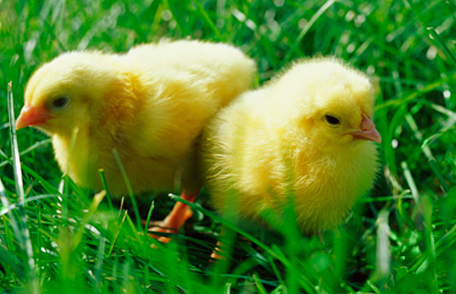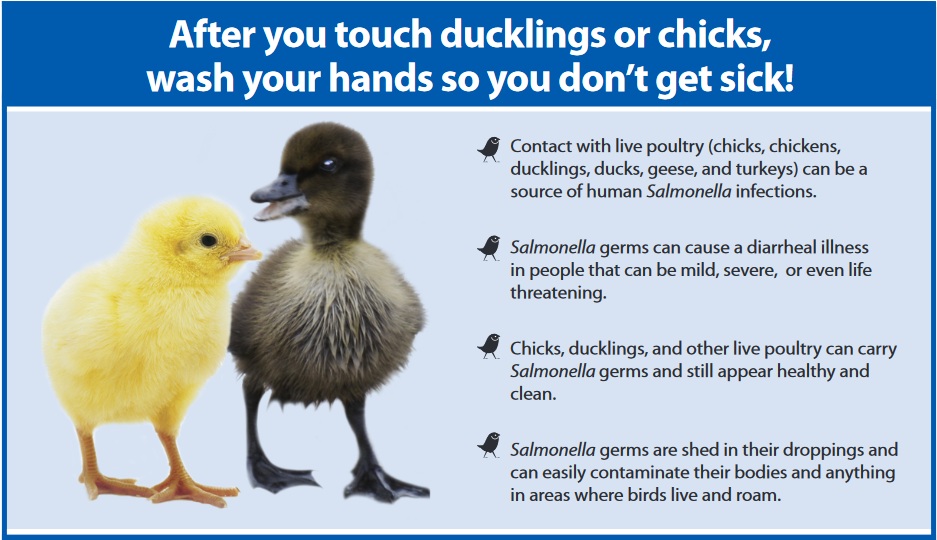 Last summer the Center for Disease Control (CDC) reported 181 people from 40 states got Salmonella infections from contact with their poultry. This year, through the end of June 2016, 611 people from 45 states have gotten sick from Salmonella infections related to poultry. Of the 611, 138 were hospitalized, and 195 (32%) were children under the age of 5.
Last summer the Center for Disease Control (CDC) reported 181 people from 40 states got Salmonella infections from contact with their poultry. This year, through the end of June 2016, 611 people from 45 states have gotten sick from Salmonella infections related to poultry. Of the 611, 138 were hospitalized, and 195 (32%) were children under the age of 5.
All Poultry can carry Salmonella and may show no signs of illness. Salmonella bacteria are spread through poultry manure, bedding, or anything that has been in contact with their manure. The bird’s feet, legs, feathers, cages, waterers, feeders, etc. can have Salmonella bacteria present. When humans make contact with a contaminated surface they can pick up the germs. Salmonella bacteria makes people sick through oral ingestion (contact with the mouth). Immediate, thorough, hand washing is key to protect yourself from Salmonella after making contact with live poultry or the facilities where poultry are kept.
People become infected with Salmonella when they put their contaminated hands or other things that have been in contact with live poultry in or around their mouth. Young children are more likely to get sick because their immune systems are still developing and they are more likely to put their fingers or other items into their mouths. Some people who have contact with items in the area where poultry live can become ill without actually touching one of the birds. Germs on your hands can spread easily to other people or surfaces, which is why it’s important to wash hands immediately after touching poultry or anything in the area where they live and roam. Center for Disease Control

Source: Center for Disease Control
CDC’s Advice for Small Poultry Flock Owners
Contact with live poultry and their environment can make people sick with Salmonella infections. Live poultry can be carrying Salmonella bacteria but appear healthy and clean and show no signs of illness. Follow these steps for protecting yourself and others while enjoying backyard poultry:
- Always wash your hands thoroughly with soap and water right after touching live poultry or anything in the area where they live and roam. Also wash your hands after handling clothes and shoes that have touched live poultry. Adults should supervise hand washing for young children.
- If soap and water are not readily available, use hand sanitizer until you are able to wash your hands with soap and water.
- Do not let live poultry inside the house, in bathrooms, or especially in areas where food or drink is prepared, served, or stored, such as kitchens or outdoor patios.
- Do not eat or drink in the area where the birds live or roam.
- Children younger than 5 years, adults older than 65, and people with weakened immune systems should not handle or touch chicks, ducklings, or other live poultry. People in these groups are more likely to have a severe illness from Salmonella infection.
- Do not snuggle or kiss the birds, touch your mouth, or eat or drink around live poultry.
- Stay outdoors when cleaning any equipment or materials used to raise or care for live poultry, such as cages, feed, or water containers.
- Read CDC’s recommendations for taking care of your backyard flock, which apply to all live poultry, regardless of the age of the birds or where they were purchased.
Human Salmonella Infection Symptoms and Treatment
According to the CDC, Salmonella infections in people may cause diarrhea, vomiting, fever, and abdominal cramps. Salmonella infections in people are usually resolved within 5-7 days with minimal treatment, other than drinking plenty of fluids. Severe diarrhea may require hospitalization for re-hydration with intravenous fluids. Make physicians aware of potential contamination from contact with poultry. Lab tests are recommended to determine if Salmonella is the cause of the illness. Infants, elderly persons, and those with weakened immune systems are more likely than others to develop severe illness. In cases of severe infection, Salmonella can spread from the intestines through the bloodstream throughout the body. Death can result from severe infections without prompt antibiotic treatment.
Links to more information on this subject:
Salmonella Infections Linked to Live Poultry in 2016
CDC’s Salmonella website
What Are the Risks of Contracting Diseases Associated with Chickens?
- 2026 Florida Bull Test Sale – Performance Data Evaluation Simplified - January 9, 2026
- Panhandle Corn & Soybean Update Friday – February 6 - January 9, 2026
- Peanut Maturity Update – 10/9/25 - October 10, 2025
